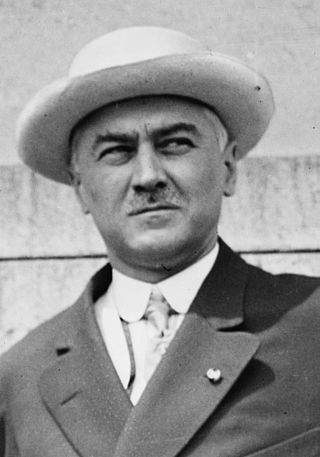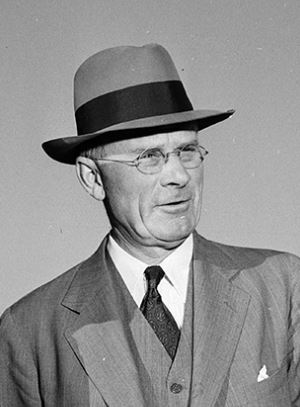Related Research Articles

Clarence Douglas Dillon was an American diplomat and politician, who served as U.S. Ambassador to France (1953–1957) and as the 57th Secretary of the Treasury (1961–1965). He was also a member of the Executive Committee of the National Security Council (ExComm) during the Cuban Missile Crisis. His conservative economic policies while Secretary of the Treasury were designed to protect the U.S. dollar.

Prescott Sheldon Bush Sr. was an American banker and Republican Party politician. After working as a Wall Street executive investment banker, he represented Connecticut in the United States Senate from 1952 to 1963.A member of the Bush family, he was the father of President George H. W. Bush, and the paternal grandfather of President George W. Bush and former Florida Governor Jeb Bush.

Lester B. Pearson United World College of the Pacific is one of eighteen schools and colleges around the world in the United World Colleges movement, located on Vancouver Island, British Columbia, Canada. It is named after the late Canadian Prime Minister Lester Bowles Pearson, winner of the 1957 Nobel Peace Prize, and an early champion of the college. The mission of the UWC movement and of the school is to "make education a force to unite people, nations and cultures for peace and a sustainable future".

The East–West Center (EWC), or the Center for Cultural and Technical Interchange Between East and West, is an education and research organization established by the U.S. Congress in 1960 to strengthen relations and understanding among the peoples and nations of Asia, the Pacific, and the United States as part of Cold War diplomatic efforts.

Teachers College, Columbia University (TC) is the graduate school of education, health, and psychology of Columbia University, a private research university in New York City. Founded in 1887, Teachers College has served as one of the official Faculties and the Department of Education of Columbia University since 1898. It is the oldest and largest graduate school of education in the United States.

The Columbia University School of Social Work is the graduate school of social work of Columbia University in New York City. It is one of the oldest social work programs in the US, with roots extending back to 1898. It began awarding a Master of Science degree in 1940. As of 2018, it was one of the largest social work schools in the United States, with an enrollment of over 1,000 students.
NYU Grossman School of Medicine is a medical school of New York University (NYU), a private research university in New York City. It was founded in 1841 and is one of two medical schools of the university, the other being the NYU Grossman Long Island School of Medicine. Both are part of NYU Langone Health.
McBurney School was a boys college-preparatory school in Manhattan run by the YMCA of Greater New York. Its name commemorates Robert Ross McBurney, a prominent New York YMCA leader during the late 19th century.
The Leonard N. Stern School of Business is the business school of New York University, a private research university based in New York City. Founded as the School of Commerce, Accounts and Finance in 1900, the school received its current name in 1988.

The Graduate School of Arts and Sciences is the graduate school of Columbia University. Founded in 1880, GSAS is responsible for most of Columbia's graduate degree programs in the humanities, social sciences, and natural sciences. The school offers MA and PhD degrees in approximately 78 disciplines.
Marion Klein Sanders was an American journalist, editor, and writer.
The American Assembly was a think tank at Columbia University, founded in 1950 by General Dwight Eisenhower. It was his most enduring achievement and legacy as president of Columbia, though some, such as his successor as President of Columbia University, Grayson Kirk, believed that the idea was "naive" and "extremely simplistic."

John Aikman Stewart was a New York City banker who during the administration of Grover Cleveland replenished the nation's gold supply by issuing new bonds. He was also the third person in its history to serve as acting President of Princeton University from 1910 to 1912. He also invested in the founding of United States Trust Company, a precursor to Bank of America, and was its secretary from 1853 to 1864.

F. Warren Hellman was an American billionaire investment banker and private equity investor, the co-founder of private equity firm Hellman & Friedman. Hellman also co-founded Hellman, Ferri Investment Associates, today known as Matrix Partners. He started and funded the Hardly Strictly Bluegrass festival. Hellman died on December 18, 2011, of complications from his treatment for leukemia.
The Arnold A. Saltzman Institute of War and Peace Studies (SIWPS) is a research center that is part of Columbia University's School of International and Public Affairs in New York. It was founded in 1951 by President of Columbia Dwight D. Eisenhower as the Institute of War and Peace Studies (IWPS) and was led for its first 25 years by Professor William T. R. Fox. It was given its current name in 2003. By its own description, the institute's researchers analyze "the political, military, historical, legal, economic, moral, psychological, and philosophical dimensions of international relations."
Sigmund Marshall Kempner was an American investment banker and founder of the French Bank of California, later known as Bank of the West.

Samuel Sloan Colt was an American civil servant, banker, and philanthropist. He served as president and chairman of Bankers Trust, as a commissioner and chairman of the Port Authority of New York and New Jersey, and as a director of the Federal Reserve Bank of New York.
Armand Grover Erpf was an American investment banker, philanthropist, and art collector. He was a senior partner at Loeb, Rhoades & Co., chairman of the Executive Committee of the Crowell-Collier Publishing Company, and helped finance the New York magazine.
The Columbia Lectures in International Studies, also known as the Columbia Seminars in International Studies or as just the Columbia Seminars, was an educational television series of the early 1960s. It consisted of a series of half-hour broadcasts delivered by the faculty of Columbia University and prepared in cooperation with the university's School of International Affairs and Regional Institutes, with professors from other parts of the university also sometimes taking part. The series was produced by a commercial station, WNEW-TV Channel 5 in New York, and aired in early morning time slots on that station and others owned by Metromedia.
References
- 1 2 3 Jacobs, Travis Beal (2001). Eisenhower at Columbia. Piscataway, New Jersey: Transaction Publishers. pp. 115ff, 152, 245, 248–249.
- 1 2 Clark, Douglas E. (2013). Eisenhower in Command at Columbia. Lanham, Maryland: Lexington Books. p. 97. ISBN 9780739178379.
- 1 2 3 "Realty Man Named Head Of Columbia Associates". The New York Times. May 13, 1952. p. 15.
- ↑ "Financier Named Head Of Columbia Associates". The New York Times. June 24, 1956. p. 42.
- 1 2 "Banker Is Named Head Of Columbia Associates". The New York Times. October 21, 1959. p. 36.
- ↑ "Wall Street: The Renaissance Banker". Time. April 13, 1962.
- ↑ "Columbia to Present TV Series By Faculty on Foreign Affairs". The New York Times. March 7, 1962. p. 71.
- ↑ Logsdon, Richard Henry (1965). The Vast Library Resources of New York City and the Developments which Will Occur in the Next Decade: An Address Delivered Before the Columbia Associates on April 15, 1965.
- ↑ See "1950s-1970s" index entry at Finding aids.